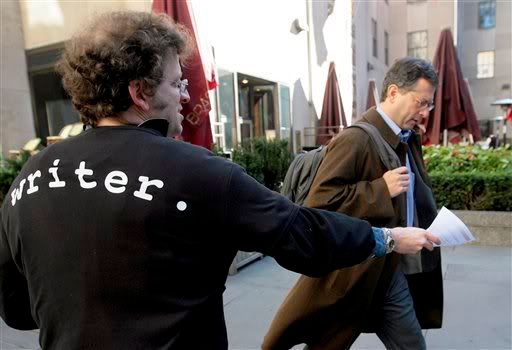Author's posts
Dec 23 2007
Which Side Are You On?
Today I read a lot about the Astor Place Riot of 1849. It’s not exactly holiday reading. But it is a story worth telling here.
The Astor Place Riot occurred May 10, 1849 at the Astor Place Opera House. When it was over 22 people were dead and another 38 were injured. It was a deadly confrontation between the poor and the rich, who controlled the police and militia. The riot was triggered by rival performances of The Scottish Play by Shakespeare.
Join me below.
Dec 21 2007
Nicaragua: Conviction Reversed, Eric Volz Freed! (Updated)
cross posted at The Dream Antilles and Orange World
Update (12/20/07, 4:04pm ET): CNN reports:
An American man held in a Nicaraguan jail was released Friday, four days after a court overturned his conviction on charges of murdering his former girlfriend, his family told CNN. /snip
A mix-up kept Eric Volz, 28, of Nashville, Tennessee, in custody after an appeals court reversed the ruling that found him guilty of the 2005 death of Doris Jimenez.
Thursday night, a Nicaraguan appeals court in Granada cleared up the confusion and signed release papers for Volz, said Maria Jose Oviedo, assistant to one of the judges on the court.
Once the documents were processed by the police hospital in Managua — where Volz was undergoing treatment for a variety of ailments — he was set free under Nicaraguan law, a court official said.
This probably doesn’t end the case. CNN reports that the prosecutors may still appeal.
The original essay:
Back in March 23, 2007, I wrote an essay about Eric Volz, an American convicted in Nicaragua of a murder he didn’t commit. The victim was his girl friend; he had proof that he was far away in Managua when the murder took place. He was convicted anyway in what I felt was a classic, ugly miscarriage of justice. And he was sentenced to 30 years’ imprisonment. He’s been locked up ever since in Nicaragua. Now there’s some good news and some bad news about the case.
The good news is that the conviction has been reversed. The bad news is that Eric Volz is not free and that the government will apparently seek a further appeal in the case to the Supreme Court of Nicaragua. He may be detained until that appeal is completed.
This from The Wall Street Journal:
Days after a Nicaraguan appeals court threw out his murder conviction and ordered him freed immediately, Eric Volz, a 28-year-old surfer-turned real-estate broker, is still in custody. His case is taking bizarre new turns that shine a spotlight on the unpredictability of the Nicaraguan legal system.
The delay also brought a fresh round of exasperation for Mr. Volz’s family members, who believed Monday that Mr. Volz was on the verge of walking out of custody and on to a jet home. “I feel like my son has been kidnapped,” Maggie Anthony, the man’s mother, said by telephone.
The U.S. Embassy in Managua issued a statement on Tuesday calling on local authorities to implement the appeals court order freeing him, and return his passport. “We trust that the Nicaraguan authorities will ensure the safety and well being of Mr. Volz while he is in custody.”
Mr. Volz’s lawyer, Fabbrith Gomez accused court officials of using illegal tactics to delay Mr. Volz’s release while they regroup and attempt to mount a new case, or a Supreme Court appeal. For example, under Nicaraguan law, before Mr. Volz can be freed, the lower court judge who first convicted him must acknowledge the appeals court ruling with a signature. That judge has so far avoided signing. She didn’t show up at her courthouse when the papers arrived, claiming she had a flat tire, members of Mr. Volz’s defense team have said. Later, the judge claimed to have returned the unsigned papers back to the appeals court on the grounds that the pages of the appeals court ruling weren’t numbered correctly. The appeals court, meantime, says the papers were never received – and the whereabouts of the ruling are unknown at this time.
It’s hard to imagine a legal system in which a judge’s signature on original documents can hold up release of a defendant and the documents are driven across the country to be signed. This case has previously required a suspension of disbelief, so that may be appropriate again now.
CNN makes the procedure seem only slightly more rational:
Nicaraguan prosecutors are appealing a court’s decision that overturned an American man’s conviction in the killing of his former girlfriend and set the stage for his release, officials said.
Magazine publisher Eric Volz’s mother says she’s concerned for his safety.
The office of Isadora Ibarra, prosecuting attorney, said she had left Wednesday to deliver the appeal to Granada.
Eric Volz, 28, of Nashville, Tennessee, remains in custody despite the Monday ruling by a Nicaraguan appeals court that he should be released immediately.
His attorney, Fabbrith Gomez, has said the Managua judge who sentenced Volz — Ivette Toruno Blanco — was stalling on signing court documents, holding up his release. Blanco has said the documents were incorrectly numbered and returned to Granada, Gomez said.
So the craziness of this case continues. Eric Volz is not yet free. His case may be headed for a Supreme Court review. I have been unable to find information about whether bail is available to Volz pending a further appeal by the Government.
For updates: click here.
Updated Comment: Arrgh! The things one has to do to skirt the 2-diary rule!
Dec 20 2007
You Talkin to Me? You Talkin to Me?
The Garifuna people of Belize and Guatemala have a very special culture and a very special language. In fact, the men have a language for speaking to men, and the women have a language for speaking to women. Specifically
One interesting feature of Garifuna is a vocabulary split between terms used only by men and terms used only by women. This does not however affect the entire vocabulary but when it does, the terms used by men generally come from Carib and those used by women come from Arawak.
When Garifuna people speak to each other, they are consciously aware of whom they are speaking with and they know what language is appropriate.
Which brings me to the US and the separate languages used in the US in political discourse. The right and its media refer to “harsh interrogation” techniques. The left should refer to “torture.” The right and its media refer to “extraordinary renditions”. The left should refer to “kidnappings” and “illegal extraditions.” The right wing refers to “illegal immigrants.” The left should say “undocumented workers.” You get the idea. I could go on and on. Suffice it to say that the traditional media almost always use the right wing language. The left wing language can be found in some places in Leftblogistan, but even there the right wing language frequently infiltrates the discussion.
So I have made a late 2007 early 2008 resolution. When discussing the political issues surrounding the abridgment of the US Constitution and US policy, I am no longer going to use any of the right wing vocabulary. In fact, I am going to ferret out all right wing language and substitute other, clearer, more precise words in my writing and discourse.
I am convinced that when I drop right wing language it will immediately make it clear that I am no longer indulging in the same incorrect assumptions as those who speak the right wing language. And my new choice of words will, I hope, cut through all of the pernicious verbal forms our traditional media persist in serving up. This can only lead to increased clarity and precision. And it can only end the prevalence of that fuzzy code the right wing speaks to us to subvert our own expressions.
Want to join me in this? I hope so.
Dec 15 2007
Finally Ending The Death Penalty
cross posted at The Dream Antilles

On Thursday, the New Jersey legislature voted to end capital punishment in that state. I was delighted by the breaking news, and posted an essay. Yesterday, I learned that around the world, death penalty abolitionists were rejoicing and that in Italy the Coliseum was being illuminated in celebration. I was delighted, and posted an essay. Today my happiness continued. The New York Times has an editorial about the death penalty. It begins:
It took 31 years, but the moral bankruptcy, social imbalance, legal impracticality and ultimate futility of the death penalty has finally penetrated the consciences of lawmakers in one of the 37 states that arrogates to itself the right to execute human beings.
This week, the New Jersey Assembly and Senate passed a law abolishing the death penalty, and Gov. Jon Corzine, a staunch opponent of execution, promised to sign the measure very soon. That will make New Jersey the first state to strike the death penalty from its books since the Supreme Court set guidelines for the nation’s system of capital punishment three decades ago.
Some lawmakers voted out of principled opposition to the death penalty. Others felt that having the law on the books without enforcing it (New Jersey has had a moratorium on executions since 2006) made a mockery of their argument that it has deterrent value. Whatever the motivation of individual legislators, by forsaking a barbaric practice that grievously hurts the global reputation of the United States without advancing public safety, New Jersey has set a worthy example for the federal government, and for other states that have yet to abandon the creaky, error-prone machinery of death.
More over the jump.
Dec 15 2007
Congratulations, New Jersey!!
Yesterday I posted an essay announcing that New Jersey was about to legislatively abolish the death penalty. I was elated. Apparently, I was not alone. Today the IHT reports:
Rome will light up the Colosseum in support of the planned abolishment of the death penalty in the U.S. state of New Jersey, a lay Roman Catholic organization said Friday.
The Sant’Egidio Community, which is at the forefront of an international anti-death penalty movement, said in a statement that the arena will be lit up when the state’s governor, Jon S. Corzine, signs the legislation within a week.
New Jersey is poised to become the first U.S. state in four decades to abolish the death penalty after votes by state legislators this week.
Sant’Egidio praised New Jersey’s decision, saying it is a “crucial passage” for a worldwide moratorium on capital punishment.
Rome’s Colosseum, once the arena for deadly gladiator combat and executions, has become a symbol of the fight against capital punishment. Since 1999, the first century monument has been bathed in golden light every time a death sentence is commuted somewhere in the world or a country abolishes capital punishment.
I am so happy that this news is receiving the response it deserves. And I hope that those abolitionists who worked so very hard and consistently to bring about this legislation– that means you, too, Abe Bonowitz– are enjoying the fruits of their victory. I also hope this will inspire all of the rest of us!
Dec 13 2007
Breaking: New Jersey To Abolish Death Penalty
This from AP should bring cheers and applause:
The New Jersey Assembly approved legislation Thursday to abolish the state’s death penalty, making Gov. Jon S. Corzine’s signature as the only step left before the state becomes the first in four decades to ban executions.
Lawmakers voted 44-36 to replace the death sentence with life in prison without parole. Corzine, a Democrat, has said he will sign the bill within a week.
This is a fantastic victory by abolitionists in New Jersey, and something that should inspire those in the other states.
The vote comes as state executions across the US are on hold until the Supreme Court decides the lethal injection challenge.
Break out the champagne!!
Details on the vote now at Blue Jersey.
WaPo suggests the victory had its roots in the state’s finances:
The repeal bill follows the recommendation of a state commission that reported in January that the death penalty “is inconsistent with evolving standards of decency.” But equally persuasive to lawmakers was not saving lives but money — it costs more to keep a prisoner indefinitely on death row than incarcerated for life.
And Reuters adds:
In New Jersey, a legislative commission in January 2007 recommended abolishing the death penalty, saying there was no clear evidence it deterred the worst crimes, and that it was “inconsistent with evolving standards of decency.”
I am so very pleased with this! This is the best good news I’ve had all week! I hope you all are enjoying this even a tenth as much as I am!!
Dec 09 2007
Solidarity With The WGA: What We Can Do
Today, AMTP broke off negotiations with the Writers Guild (WGA). This is not a good development and may prolong the strike.
What, if anything, can we do to support the WGA strikers and to be in solidarity with the WGA?
Join me on the right side of this picket line.
Dec 04 2007
Happy Chanukah, Docudharma!
The Jewish festival of Chanukah begins this evening at sundown and lasts for 8 days. It is not a major religious holiday. But because it falls near Christmas, it’s often looked at as the “Jewish Christmas”, which it isn’t. In fact, gift giving, traditionally, was not a part of the holiday, though it is now.
Join me across the border for the historical basis of the holiday, a holiday recipe and the “rules” for playing dreidel.
Dec 01 2007
12/2: Voting In Venezuela
Sunday, December 2, 2007, is Voting Day in Venezuela. This diary is about the referendum and the last minute developments leading up to the vote.
What’s the vote about? BBC reports:
On 2 December, Venezuelans will decide whether or not to approve a package of constitutional reforms, which include ending the limits on presidential terms.The changes, which would affect about a quarter of the constitution’s articles, were approved by the National Assembly, which is controlled by President Hugo Chavez’s supporters.
The referendum is the last step needed for the changes to come into force. Around 60% of voters are expected to take part
More across the wide, turquoise Caribe.
Dec 01 2007
Have You Noticed The Front Page?
After about 48 hours of food fights, pie fights, near and actual GBCW diaries and comments, and complaining to and about each other, this blog is still here. And the stories on the front page are all really great.
I admit it. The past couple of days have been hell here. I missed most of yesterday’s events because of work. I’m thankful for that. And today there were plenty of very intense, often unpleasant exchanges, and at least two explicit treaties. I thought about throwing myself and my keyboard through the window on a couple of occasions, and I also thought about leaving sans GBCW without turning the lights off. I didn’t do those things. I wondered why I didn’t do them. And then, all of a sudden, poof!! a front page that is precisely what imo makes this blog worth it. That must’ve been why I stayed.
So, to all of you, thanks for sticking around, thanks for writing, reading, and commenting. And especially, thanks for building such an incredible community. And if you left and are reading this anyway, please consider coming back.
Nov 30 2007
Food Fights, How To Enjoy
Food fights happen.
A food fight is a spontaneous form of chaotic collective behavior, in which food is thrown around a room, usually a cafeteria, in the manner of projectiles. It is usually started by one person, sometimes by accident. When it is not started by accident, the starter would normally scream “FOOD FIGHT!”, and throw any food at hand to get things started. Those who participate in food fights in cafeteria settings are usually punished severely. Food fights are a common element in slapstick comedy, with the pie in the face gag being especially prominent. Food fights are frequently featured in children’s television and books, usually as an example of destructive or reckless behaviour. It also seems to show some degree of coolness.
A food fight looks like this:
A pie fight looks like this:
We are informed by the all knowing Wiki
One famous food fight scene in a movie took place in National Lampoon’s Animal House, another took place in Hook, however the food fight was named a ‘Bangarang’ in the Lost Boys terminology. Food fights are rare in real life settings, despite being extremely common plot points in media such as cartoons. Though usually associated with juvenile settings such as schools, there are notable incidents that take place in more refined locations, such as the food fight at a lunch meeting of the Legislative Yuan of Taiwan.
Obviously, the all knowing Wiki doesn’t know about blogs. Oftentimes food fights break out on blogs. We’ve had an outbreak recently. But unlike analog food fights, on blogs the food fight does not end in uproarious laughter at the sight of ridiculous and unnecessary waste of food, stained clothing, and floors covered in glop. And unlike analog food fights, on blogs the food fight isn’t broken up by the principal of the junior high school. Or the police. Or the warden. No, on blogs food fights can become an unpleasant epidemic, because while one is continuing the typing and expanding the food fight, one cannot see the face and the eyes of the person who is getting a pie in the face. Or a hamburger in the hair. Or a mustard stain on the shirt. Or a cream pie. Anywhere. And, of course, one cannot see the cream cheese in one’s own eyebrows, the pickel in one’s own pocket, and the chocolate cream in one’s ear. If we could just see that, even for one nanosecond, we’d have to laugh at our spectacle. We’d be human and laugh at our absurdity. We wouldn’t think it was all deadly serious and in earnest. How could we be doing this? we’d ask.
And we’d also laugh warily at any food that seemed still to be edible, all those claims of aggression and bullying and victimhood and bad manners. All just typred words. We’d laugh at the epithets and name calling. More typed words. We’d laugh at them as being ridiculous because we all know that we’ve been throwing food. Or watching others throw food. Or egging them on. Or decrying the food fight. Or participating in the food fight. Or wearing a garbage bag so we don’t get our clothing messed up.
Look. When a food fight breaks out, there’s no avoiding it. Everybody is affected. Everybody gets involved, whether they want to or not. And we all have our own style of involvement. If we looked, we’d see that we, all of us have food all over us. We’re, all of us, responsible for the colossal mess.
We might even laugh that in a wonderful blog with a great community devoted to making a better world, the people who are going to make the world better are right now indisposed. And distracted. And otherwise occupied. Some are actually in despair and angry. They’re not talking about making the world better. Or making the world better. No. They’re making a mess. Or reacting to the mess. For reasons they themselves cannot really explain, they cannot stop finding offenses that lead to more throwing of food.
What is wrong with us? We should laugh. Our humanness, our distractions, our follies, our beliefs, even those, things we often take so seriously, are so fallible. They should make us laugh. We should be howling with laughter.
How can you take seriously anything said to you by somebody wearing lunch? Even if it seems meanspirited. How can you throw another creme brulee? Haven’t we had enough?
Nov 23 2007
Tabasco: Let The Fingerpointing Begin
Corruption, in addition to climate change, may have been responsible for the devastation caused by the Tabasco floods. You’ll remember that floods in Tabasco last month, caused by up to 30 inches of rain, ruined all of the crops, stopped oil production, and caused one million people, about half the state’s population to be displaced. About 70,000 people were in shelters in Villahermosa and another 20,000 were living on their roofs. Indigenous people in the interior found themselves stuck on islands in the flood water. And recently, it was reported that the entire state was being sprayed with insecticides to prevent an outbreak of dengue, a mosquito born disease similar to malaria. 280 people are still unaccounted for.
Today the AP, comparing the situation in Tabasco to Katrina, reported:
The government knew Mexico’s Gulf coast was a disaster in waiting long before three rivers surged out of their banks, flooding nearly every inch of the low-lying state of Tabasco and leaving more than 1 million homes under water.
But officials admit they never finished a $190 million levee project that was supposed to have been done by 2006 and would have held back much of the rising waters that flooded Tabasco at the end of October.
The tragedy was reminiscent of the Hurricane Katrina disaster in 2005, when levees failed and swamped much of New Orleans, forcing people to flee by wading through dirty waters. In Tabasco, days of relentless rain – not a hurricane – were to blame.





